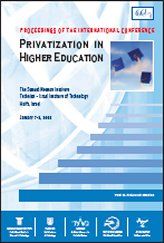Contributions by:
Philippe Aghion, Shoshana Arad, Zvi Arad, Elise S. Brezis, Morton M. Denn, Ali Doğramaci, Nehemia Friedland, Sarah Guri-Rosenblit, Grant Harman, Ranan Hartman, Rhanan Har-Zahav, Yaacov Iram, Uri Kirsch, Daniel C. Levy, Nadav Liron, Hagit Messer-Yaron, Gabriel Motzkin, Guy Neave, Thorsten Nybom, Zvi Piran, Sheldon Rothblatt, Eliezer Shalev, Steven Stav and Galit Eizman, Zehev Tadmor, Jandhyala B.G. Tilak, Manuel Trajtenberg, Meir Zadok, and Gury Zilkha.
Organizing Committee:
Nadav Liron (Director and Editor), Elise S. Brezis, Avi Ronen, Mordechai Shechter, Neal Sherman, and Meir Zadok.
In accord with the policy of the Samuel Neaman Institute to tackle national problems of major significance for the State of Israel, the Samuel Neaman Institute has been working for several years now in the area of Higher Education.
In the world it has been clear now for some time that the basis for an affluent society is knowledge , knowledge that is taught and researched at Institutes of Higher Education. Thus, in December 2004, the Neaman Institute held an important international conference where the agenda was the changes that are happening in higher educational national systems around the world, especially due to the dramatic expansion in the demand for higher education and in the availability of higher education. We brought the best researchers in the world to debate the issues and the proceedings of the book were published under the title “Transition to Mass Higher Education Systems: International Comparisons and Perspectives”, and received a lot of attention from the policy makers of Higher Education in Israel. One of the outcomes of this conference was the establishment of a Higher Education Forum to openly debate the problems of higher education in Israel, especially between Universities and Colleges. Both in the 2004 conference and at the Forum, problems related to privatization were brought up, but not in a systematic way. Because of the lack of funds due to the meteoric growth of the student body in Israel AND the decreasing support from the government, both in relative and absolute terms, the higher education institutes dramatically increased the search for alternative funding and new so called “private institutes” emerged. We thus decided it was high time to have a global look, and perspective on the entire issue of privatization , and in January 2008 we organized another international conference, again bringing in the best people on the subject in the world, to look at the problem of “Privatizations in Higher Education”. The aim was to see how countries around the world cope with these problems and consequently debate and suggest how Israel should expand its Higher Education system so that the system will stay open, amenable, honest, independent, meeting the needs of Society and the Country and maintaining independent research, both pure and applied, at the highest international level.
As in the previous cases this was a joint effort of the Samuel Neaman Institute, Bashaar – Academic Community for Israeli Society, and the United States-Israel Educational Foundation (Fulbright) . We were also supported this time by the Azrieli Center for Economic Policy at Bar-Ilan University.
The publishing of the talks and discussions now has an even more profound importance in view of the international economic crisis we are currently in the midst of, and which underscores the necessity of the Institutes of Higher Education to diversify and find additional sources of support, so that the system in Israel will keep playing the same vital role in the development of Israel it has played so far, for the benefit of Israel and its inhabitants. My hope is that these proceedings will serve the policy makers of Higher Education in Israel in the best possible way.
Nadav Liron
Former Director,
Samuel Neaman Institute
November 2008












